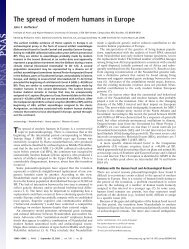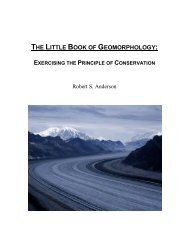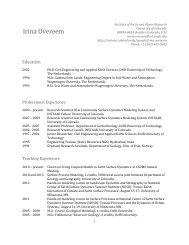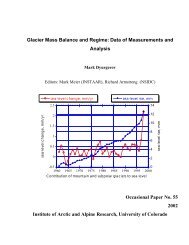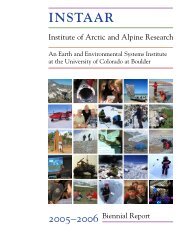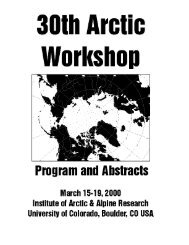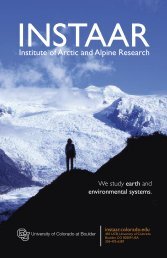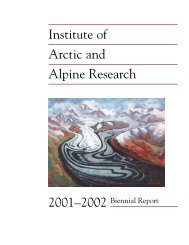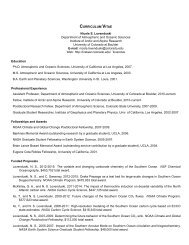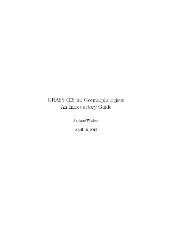Economic Feasibility Study of Colorado Anaerobic Digester Projects ...
Economic Feasibility Study of Colorado Anaerobic Digester Projects ...
Economic Feasibility Study of Colorado Anaerobic Digester Projects ...
Create successful ePaper yourself
Turn your PDF publications into a flip-book with our unique Google optimized e-Paper software.
Christopher Goemens, <strong>Colorado</strong> State University water economist. However, parameters<br />
associated with the water price (municipal prices) were not available, and the price was not<br />
adjusted. Instead, the same price was applied to the “poor” economic scenario, and the<br />
typical agricultural per acre-foot water cost (25) was applied to the “good” condition.<br />
However, net income was not as sensitive to water costs or capacity payment, as other<br />
variables. Net income was more highly sensitive to changes in electricity pricing for net<br />
metering. The low value for the energy price was provided by Mr. Derouchey <strong>of</strong> Wyoming<br />
Premium Farms.<br />
An interesting result is the affect <strong>of</strong> price changes per metric tonne <strong>of</strong> carbon credits on net<br />
income (4.0%). Anecdotal advice and published academic studies (Leuer, Hyde, and<br />
Richard, 2008) suggest that positive net income <strong>of</strong> an AD project <strong>of</strong>ten hinges on carbon<br />
credits. If net income were to show high sensitivity to carbon credit price changes,<br />
producers may show rapid reductions in pr<strong>of</strong>it, considering the rapid change in carbon<br />
credit prices from over $7/tonne in May 2008 to below $1/tonne in June 2009. However, the<br />
sensitivity analysis shows that there is a more substantial reduction in net income with an<br />
increase in costs or reduction in generator energy production. Therefore, an operation<br />
should focus its efforts on cost reduction and ensuring efficient operation <strong>of</strong> the AD unit, and<br />
less on the price <strong>of</strong> carbon.<br />
It is worth noting that emerging research is showing that the environmental benefits<br />
provided by carbon credits considerably exceed the market value. Tol (2004) summarized<br />
the environmental literature for the non-market and environmental values from CO 2<br />
reduction. Of the 28 studies he reviewed, the median value (50 th percentile) <strong>of</strong> estimated<br />
environmental benefits reflected a $14/tonne price. The mode (most common), mean, and<br />
95 th percentile values were $2/tonne, $93/tonne, and $350/tonne, respectively. Tol<br />
concluded that the true environmental benefits <strong>of</strong> a tonne carbon likely were substantially<br />
lower than $50/tonne. Therefore, the median value was used to estimate the “good”<br />
economic condition in the sensitivity analysis.<br />
Several policy implications can be drawn from the sensitivity analysis. First, given the<br />
volatility around certain variables, it can be concluded that a regional digester project in<br />
<strong>Colorado</strong> is a risky venture. In order to increase the likelihood <strong>of</strong> success in co-digestion<br />
projects (which have the potential to yield environmental benefits), the state may wish to<br />
subsidize the difference between “typical” prices and a more extreme, unfavorable prices.<br />
Second, in a related policy, the state may be able to facilitate discussions with energy<br />
companies to negotiate a more favorable rate for net metering, or reduction <strong>of</strong> energy costs<br />
for alternative energy projects. Third, the state may choose to pay the difference between<br />
“typical” carbon <strong>of</strong>fset prices with values based on estimated true environmental cost <strong>of</strong><br />
methane reduction.<br />
<strong>Economic</strong> <strong>Feasibility</strong> <strong>Study</strong> <strong>of</strong> <strong>Colorado</strong> <strong>Anaerobic</strong> <strong>Digester</strong> <strong>Projects</strong><br />
Prepared by Dr. Catherine Keske, <strong>Colorado</strong> State University<br />
August 2009<br />
Page 50 <strong>of</strong> 79



